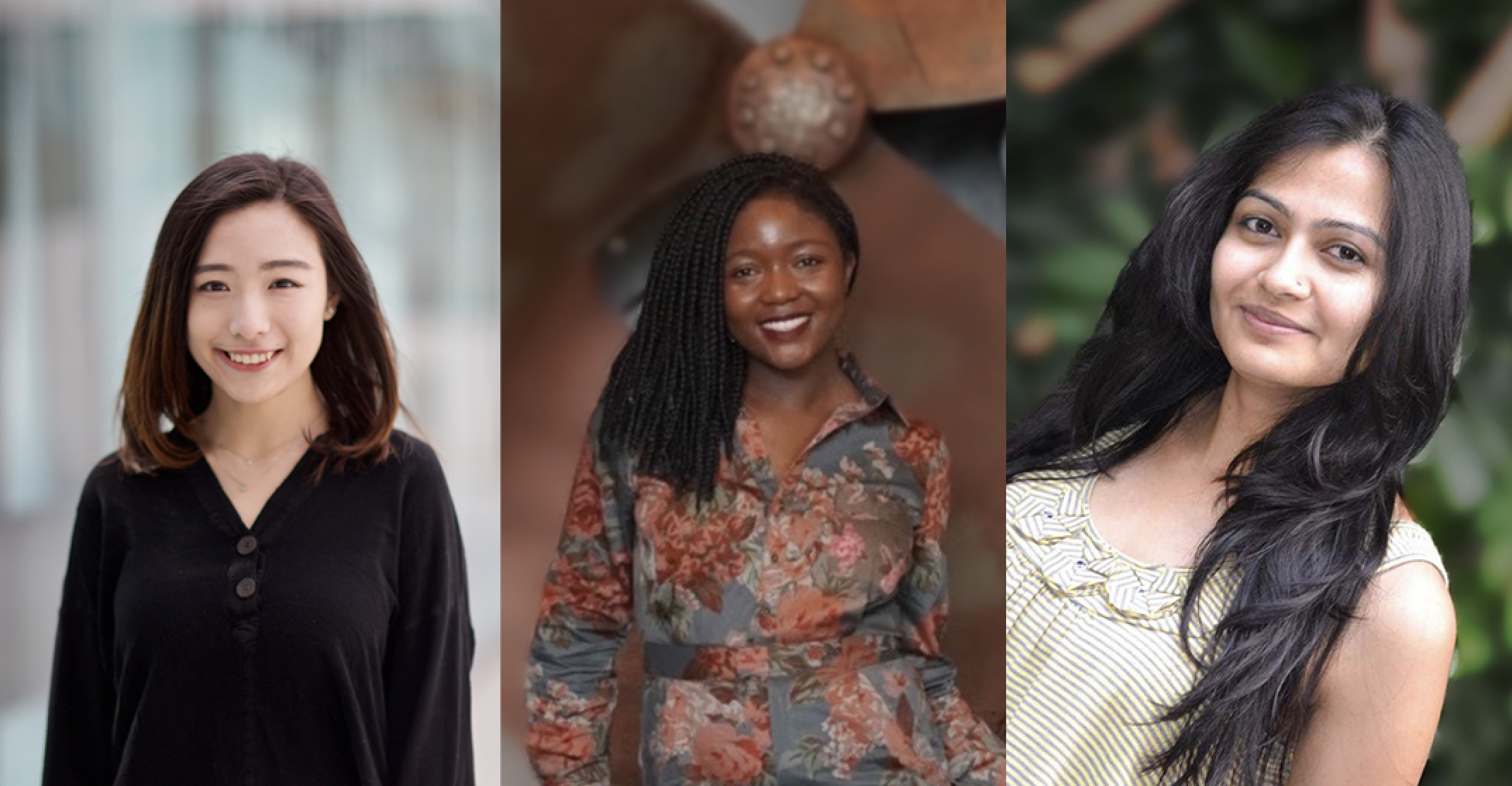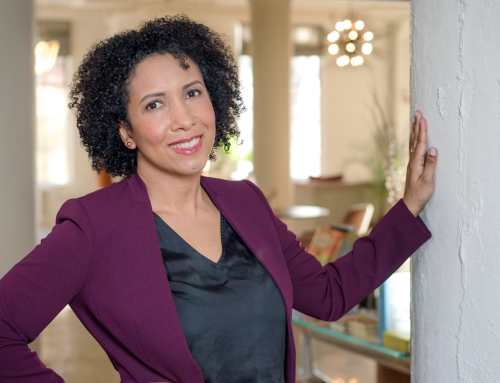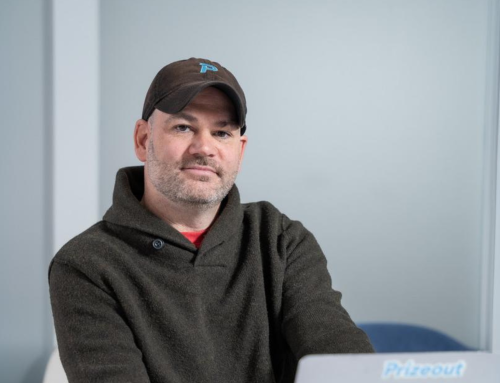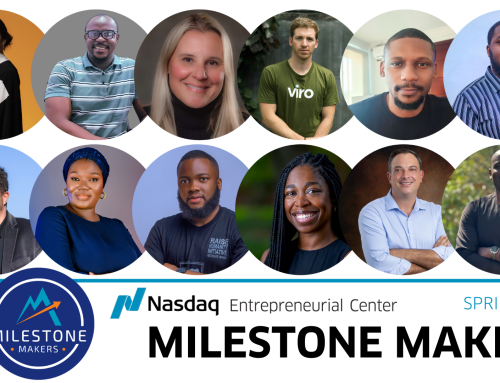UInclude, a Los Angeles-based startup whose suite of SaaS products establish equity in the recruitment process and increase workplace diversity, was founded by Sonal Patel, Toshe Ayo-Ariyo, and Danielle Ho when they were grouped together on a project at University of Southern California’s Data Analytics Bootcamp. UInclude’s inclusive writing tool uses machine learning algorithms to identify and eliminate biased language in recruitment material that deter marginalized groups from applying for roles. This ultimately diversifies employers’ candidate pool and increases the corporate representation of historically excluded individuals.
What does “entrepreneurship” mean to you?
 Sonal Patel: For me, entrepreneurship is the best way to grow by creating and inspiring change. It’s the ultimate sport that helps you build self-discipline, communication, time management, risk management, networking, and technical skills.
Sonal Patel: For me, entrepreneurship is the best way to grow by creating and inspiring change. It’s the ultimate sport that helps you build self-discipline, communication, time management, risk management, networking, and technical skills.
Toshe Ayo-Ariyo: Entrepreneurship is a journey in which you are challenged and stretched intellectually, mentally, and emotionally. It’s a process where previously unknown versions of yourself and your abilities are unearthed. When you allow it to, it shapes and refines you into an even more relentless and adept version of yourself.
Danielle Ho: To me, entrepreneurship is both a mental and a strategic game, in which there are no set rules and more than one way of playing it. It is vital to perform comprehensive market research, identify consumer problems, and pinpoint realistic competitors. Based on that analysis, you can then come up with effective strategies and make confident decisions for every big and small, yet perfect move. Try, fail, learn, and repeat until you find your own formula for success.
How did your company come to be?
UInclude Founders: We met in December of 2019 while participating in the University of Southern California’s Data Analytics Bootcamp. The three of us were placed into a project group for our third project and we all happened to be women. So we decided that we wanted our project to be female-centered. To start with, we conducted our own research on women in the workforce and found that an increase in global female workforce participation over the last few decades is positively associated with GDP growth. Through our research, we also learned that a significant amount of women’s productive potential remains untapped and that women are still an underutilized labor source around the world.
After a lot of discussions, we realized that one way to increase female workforce participation is by eliminating the use of gender-biased wordings in job descriptions which is a significant, yet overlooked barrier to women entering the workforce. For our final project, we created a bias mitigation tool that identifies gender-biased language in job ads. That project led to what is now UInclude. Our ambitions for our company and product have expanded significantly as we’re now creating a product that is capable of identifying biased language against a number of marginalized groups.
How has your business changed in response to the COVID-19 pandemic?
UF: While the COVID-19 pandemic did not directly change the nature of our business, it has indirectly created more opportunities for us. The pandemic has made people rethink their lives and work. Currently, American workers are quitting their jobs at a record rate in search of more money, more flexibility, and more happiness. During a time when many employers struggle to fill positions, our product offers a solution that helps them increase job appeal, employees’ sense of belonging, and apply rate by creating inclusive recruitment materials.
Additionally, the Social Justice movements that arose during the height of the pandemic have illuminated the inequities that are still present in our society and in both public and private systems. Companies are looking for solutions that help them level the playing field for historically excluded groups and increase the diversity in their workplaces. UInclude provides a solution to many companies’ diversity recruitment needs.
 How is your company changing the landscape?
How is your company changing the landscape?
UF: We are raising awareness about unconscious bias in job descriptions and promoting the use of inclusive language in professional settings. By taking a data-driven and research-backed approach, UInclude provides a more practical and effective method for eliminating unconscious bias in recruiting than conventional unconscious bias training that has questionable effectiveness. We help employers make every prospective candidate feel welcome and included.
What do you wish you knew when you started? Is there anything you would do differently?
SP: I’ve learned that experience isn’t a prerequisite to growing a successful startup. Experience is overvalued (not completely unimportant – but massively overvalued) by people who are thinking about starting a company. In almost all cases, no matter what knowledge you bring to the table, you will learn most of what you need to know about the problem, your customer, and the best solution only after you start your company. It’s essential to work smarter, not harder, to survive as an entrepreneur, and building a team of people who have a wide variety of strengths is crucial.
TA: I wish I knew just how unpredictable and uncertain the journey is. Before deciding to take the leap, I made the decision knowing that the experience would come with a certain degree of uncertainty. However, I expected to attain clarity and experience smoother sailing a few months into being a full-time entrepreneur. I am starting to recognize that uncertainty is ever-present in every entrepreneur’s experience. Absolute clarity will likely never come, so part of being an entrepreneur is learning how to be comfortable with that.
DH: I first started coding around six months before we founded UInclude. I wish I knew that I was and am capable of much more than I think so that I didn’t have to spend time doubting my ability to be the founder of a tech start-up. I now believe that every one of us is capable of enduring and accomplishing seemingly impossible tasks.
What advice/credo do you live by as you grow the business / what is your professional and personal mission statement?
SP: “My biggest challenges have been my biggest teachers. Every challenge presents an opportunity to learn and grow”. I live by this every day to the best of my abilities and remember it when I need it the most.
TA: Making mistakes is an inevitable and necessary part of the entrepreneurial journey! This advice has been especially helpful for me as someone who was previously mistake-averse and risk-averse. I overanalyzed every decision and tried to do everything I could do to avoid making a mistake. But I’ve learned that there’s no way around making mistakes, and being extremely circumspect is counterproductive in that you sacrifice speed and learnings in the process. The key is to find the right balance between making informed and quick decisions. My personal and professional missions are to make sure I am learning, growing, and being intellectually challenged constantly while creating meaningful change and impact.
DH: You have to focus your intention on what is important and by giving at least 100 percent commitment to make something happen.
 Where do you find inspiration when faced with challenges?
Where do you find inspiration when faced with challenges?
SP: Immersing myself in a strong spiritual practice of meditation helps me in times of crises and challenges and it helps me move forward with determination on the journey that I’m embarking on. Also, connecting myself with nature is one of my best practices that helps me feel completely revitalized, calms me, and gives me the energy boost I need for the day.
TA: I listen to other underrepresented entrepreneurs speak about their entrepreneurial journey and what they’ve learned along the way. Hearing about the challenges they’ve been able to overcome gives me the boost of energy and courage I need to tackle whatever challenges we’re facing.
DH: I like to speak with my peers who are working in different industries. It offers me a different perspective on problems and allows me to think outside of the box and reach a creative solution.
What does “success” look like for you? What do you think will help you achieve it?
SP: Success to me as a “mompreneur” is about finding work-life balance, serving as a role model, and achieving personal and professional happiness. I believe that two of the most challenging, but rewarding endeavors a person can undertake are starting a family and launching a business. Both are full-time commitments that demand a whole lot of patience, perseverance, and love. Being an entrepreneurial-minded parent, I willingly choose to do both, and I couldn’t be happier about it.
TA: Success for me is creating a viable company that creates effective solutions that solve the problem we are setting out to solve and serve the communities we are aiming to serve. This will be achieved through persistence, resilience, and a lot of courage.
DH: Agency is how I measure my success in my personal life and career. To me, success is to have full command of my life: be able to do what I like to do and only do what I want to do. The essential components of success are self-discipline, long-term thinking, and prioritization. Freedom is always the result of self-control!
Has personal or professional “success” changed for you since the COVID-19 pandemic?
SP: Being a mompreneur means being able to lead through constant change. I have a 7 year old daughter, so success to me means being flexible and adaptable daily. I am constantly having to challenge, evolve and loosen my expectations around what her day looks like, and what it means to parent especially while working from home. Cultivating a positive mindset allows me to do this successfully.
TA: My definition of personal success is no longer tied to my academic or professional achievements. Success for me is now centered around living a well-balanced, well-rounded life while creating something that is meaningful and impactful.
What’s it like to work alone or with your partners? What advice do you have for fellow entrepreneurs about building and leading teams?
SP: Working with my team has been a great learning experience. I believe no one is good at everything, but everyone is good at something. There are many ways you can delegate or ask for support that will help you reach your goals, regardless of how gutsy or detailed it is. Start thinking about ways you can expand your village, and who you want in it. The power of collaboration and community is very real, and when you combine motivation and desire from others, no problem is too big to solve.
TA: Having two co-founders who are equally dedicated and motivated to bring the vision to life has been amazing. Navigating challenges that are inevitable on this journey are a lot easier to do when you have an extremely resilient team. My advice for other entrepreneurs is to make sure you’re building a team of people with diverse skillsets. That way, you and your team are able to take care of most necessary tasks internally, which is especially important during the early stages when there’s a lot of work to be done, and very limited financial resources to outsource those tasks. Finally, for social enterprises especially, build teams of people who are passionate about the problem you’re trying to solve. Collective passion is the fuel you’ll need when you experience roadblocks.
DH: There is no doubt that my team is special to me. Working with them, I discovered a side of myself that I had never explored nor shown anyone. Trust is my one piece of advice for building a successful team. If you suffer from the “Do-Everything-Yourself Syndrome” as I did because you are afraid that tasks will not be completed exactly the way you expect, learn to delegate tasks effectively. Sharing responsibilities is the art of learning to trust, and with it, you can do great things and open up new and unimagined possibilities.
Many entrepreneurs continue to perfect their daily routines to support their work and greater vision; would you mind sharing your morning routine or a regular ritual that grounds your work each day? How has it changed in recent months?
SP: I cherish my morning meditation and family time rituals. After meditating for 45 minutes, I enjoy helping my daughter get ready for school and making breakfast. I take her to school around 7am and I absolutely love the time in the car where we can chat, pray and spend extra moments together. I usually get back home close to 9 and then go for a walk at the park. After my morning routine, I get to work, set my priorities for the day, and try to be proactive as things are bound to be crazy busy at some point. During the evening, I treasure dinner with my family and the satisfying feeling of simply being together with them.
TA: My daily practices are extremely grounding for me. I start most days off with a devotional and meditation. In the afternoon, after a few hours of work, I work out. Throughout the day, I make sure that I am cooking and eating nourishing and nutrient-dense foods. During the evening, I clear my mind by taking an evening walk. Each of these things ensures that I am nurturing myself physically, mentally, emotionally, and spiritually. They also help me show up as the best version of myself, which means that I am more effective as an entrepreneur, a team member, a friend, and all of the other roles I play in my life.
What keeps you motivated during this time?
SP: Being part of a team that are bonded over a shared passion for diverse global change keeps me motivated. We all come from diverse backgrounds, so we have first-hand experience with the problem that we are motivated to address. Our varying areas of expertise also help us work together collaboratively and efficiently. Building a business is no easy feat so building a village is essential!
TA: Knowing that our solution has the potential to unlock opportunities for marginalized communities that they may not have been able to access otherwise keeps me motivated daily.
DH: My motivation derives from my strong belief that our product is going to create great value for employers who value workplace diversity and that it will create an innovative solution to a long-standing industry problem. On a more personal level, the dedication and positivity of my teammates, the kind words and support from my family and friends, and even from the freelance software developers that we’ve worked with, keep me going.
What kind of an entrepreneur do you want to be known as, as in, what do you want your legacy to be?
SP: Being a mompreneur, I have the luxury of doing the two things I love and am passionate about. My family is and always will be my number one priority. Parenting teaches me the grace of patience, and the strength to deal with all of the ups and downs which has been helpful in my entrepreneurial journey. Also, knowing that my daughter is proud of my accomplishments as an entrepreneur is an extraordinary feeling.
TA: I want to be known as an entrepreneur who is knowledgeable, audacious, and fervent. An entrepreneur who is capable of creating, growing, and sustaining a viable company while driving meaningful and transformational impact and change for marginalized communities.
DH: By leveraging my power well and wisely, I want to be known as an entrepreneur of influence who brings positive change in someone’s life and creates more opportunities for those who are marginalized.
What is a quote or some words of wisdom that help get you through the tough days?
SP: “Take risks in your life. If you win you may lead. If you lose you may guide.” – Vivekananda (Indian Revolutionary)
TA: “When I dare to be powerful—to use my strength in the service of my vision, then it becomes less and less important whether I am afraid.” – Audre Lorde
DH: “Life would be boring if it was always smooth sailing. Do you want to live a boring life?”
Have you experienced mentorship in your career? Do you feel it was easily available to you?
SP: We are forming an Advisory Board of experienced professionals with subject matter expertise who help guide our company through its development and growth phases. Members of the Advisory Board provide their mentorship, expertise, and insights at every stage of our company’s life ranging from scientific research to the creation of our inclusive writing tool.
TA: I have been fortunate enough to have incredible mentors at every stage of my academic and professional careers. My mentors have come about through my involvement in non-profit organizations, namely through being a student of Mind Matter’s Los Angeles chapter. Admittedly, finding a personal mentor in the entrepreneurial space has been a bit difficult, but I have been fortunate to be a part of incubator and accelerator programs most recently that have provided me with much-needed mentorship.
Who are the people who have mentored or influenced you in your life or career? How has their influence changed the trajectory of your entrepreneurial journey?
SP: Having a mentor to provide me guidance has been greatly beneficial throughout my entrepreneurial journey. Confiding in my family members, friends and teacher’s expertise has opened my eyes to what it’s really like in the field. This mentoring relationship has made me aware of all of the not-so-great things about my desired career path – which I should definitely be aware of.
Do you have someone you’d like to nominate to be profiled in our Faces of Entrepreneurship series? Please let us know by emailing media@thecenter.nasdaq.org or submit your nomination using this form.




Invite a Friend
Close